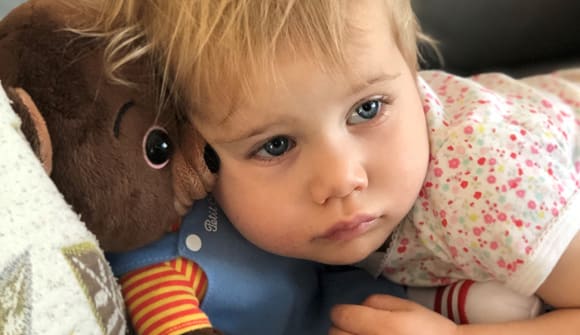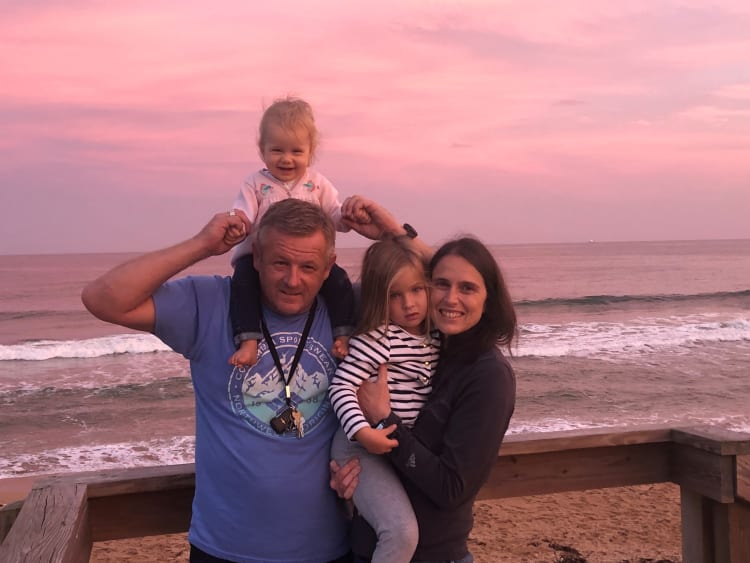Ready and waiting
ER team goes the extra mile for toddler with rare seizure disorder.
Article Author: Juliette Allen
Article Date:

When 2-year-old Zelie Satterthwaite’s eyes begin to flutter, her mother, Marion Grivotet, knows she has to act fast. That small movement is the first clue the St. Johns County toddler is about to have a seizure.
“We know the signs a seizure is coming on, so we try to remove her from the stimulus. For example, it happened at a birthday party where there was a lot going on, so I took her out,” Grivotet explained. “We all have a seizure threshold, but hers is really low. Routine vaccines, temperature changes and overstimulation have all triggered seizures for her.”
Unexpected diagnosis
Although Zelie’s parents, Grivotet and Paul Satterthwaite, now know exactly what to do when their little girl is about to have a seizure, the first episode was filled with panic and uncertainty. In the middle of the night, then-6-month-old Zelie started shaking.
“We had no idea what was happening,” Grivotet recalled. “She was convulsing and we thought she was dying.”
Filled with fear, Grivotet and Satterthwaite called 911. Zelie stopped seizing the moment first responders arrived, but she was taken to Wolfson Children’s Emergency Center at Baptist Medical Center South as a precaution. Nothing else appeared to be wrong and Zelie was unscathed.
When it happened again three months later after Zelie had recovered from a mild illness, she again was taken to Wolfson Children’s Emergency Center at Baptist South, and then transferred via Kids Kare Mobile ICU to Wolfson Children’s Hospital of Jacksonville for testing. There, Erick Viorritto, MD, pediatric neurologist with Nemours Children’s Health, Jacksonville, and Wolfson Children’s Hospital, ordered genetic testing, which revealed Zelie had a gene (SCN1A) mutation that led to a condition called Dravet syndrome.
This early diagnosis proved to be critical, as certain drugs can make seizures caused by this rare syndrome worse. Dr. Viorritto immediately started Zelie on anti-seizure medication.
Fernando N. Galan, MD, pediatric neurologist and epileptologist with Nemours and Wolfson Children’s, also part of Zelie’s care team, explained:
“This gene mutation impacts the brain’s ability to transport sodium. Because of this, her brain lives in a hyperexcitable state, which makes her more prone to seizures.”
Dr. Galan said that unfortunately, seizures associated with an SCN1A mutation and Dravet syndrome are resistant to treatment.”
Frequent visits
Because Zelie’s condition is difficult to control, her parents perfected a plan of action: the moment a seizure begins, they give Zelie emergency medication and start making their way to the ER.
“We always go to Baptist South first because it’s the closest to us and we know they have an emergency department specializing in children’s care,” Grivotet said.
Highway to help
When Zelie started seizing one Saturday evening in March 2021, her parents followed their plan. They loaded their daughter into the car and called the ER to let them know they were on the way. However, a crash on I-95 had traffic at a standstill. Since Zelie was still having a seizure and time was of the essence, Satterthwaite entered the emergency lane and tried to get to the exit.
Moments later, a motorcyclist also entered the emergency lane and he and Satterthwaite collided. No one was injured, but Satterthwaite had to pull over, further delaying getting Zelie to the ER.
A doctor caught in the traffic jam pulled over and evaluated Zelie, determining she wasn’t at immediate risk. Grivotet didn’t get his name, but she was touched by his kindness. She was also moved by what happened when they finally got Zelie to Baptist South.
“They were worried. We had called them a while ago and they were wondering where we were,” Grivotet recalled. “Not only that, the respiratory therapist stayed after her shift ended so she could watch Lola in the waiting room while Paul was on the phone with the police and insurance company, dealing with everything from the accident. The way they cared for our whole family meant the world.”
That pediatric respiratory therapist was Lydia Burnell, RRT-NPS.
“The family was thankful that I sat with Lola, but honestly the pleasure was all mine,” Burnell said. “Lola is so brave and cares so much for Zelie. She’s an amazing kid, and I had a blast hanging out with her. We discussed unicorns, Peppa Pig, and of course, I reassured her Zelie was doing well. This family has become part of our extended family.”

It takes a team
Zelie continues to receive care from Dr. Galan and the neurology team at Nemours. There is currently no cure for Dravet syndrome.
The intensity of Zelie’s seizures varies, with some requiring a transfer to Wolfson Children’s Hospital’s Pediatric Intensive Care Unit (PICU) or pediatric neuroscience unit and others simply necessitating an evaluation in the ER. Either way, all of Zelie’s journeys start at the same place.
“It’s such a relief knowing we have a true children’s emergency room nearby,” Grivotet said. “Occasionally we think about moving, but we don’t want to because we don’t want to be farther from the Wolfson Children’s ER at Baptist South.”
“I’m so thankful for the whole team at Wolfson Children’s, from Baptist South to the downtown PICU,” she added. “Their compassion is equal to the excellent care they provide.”
Minutes matter in an emergency. Wolfson Children’s has Emergency Centers throughout Northeast Florida, staffed by pediatric emergency medicine specialists. Visit wolfsonchildrens.com/er for locations and current wait times. The Wolfson Children’s Stys Neuroscience Institute provides expert care for children ages 0-18 with a wide range of neurological and neurosurgical services, from epilepsy to brain tumors. To learn more, visit wolfsonchildrens.com/neuro.



